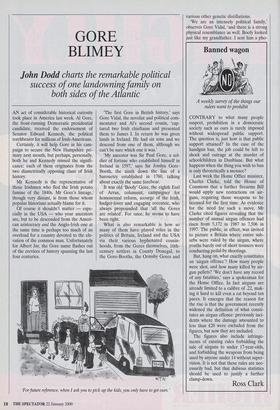Banned wagon
A weekly survey of the things our rulers want to prohibit
CONTRARY to what many people suspect, prohibition in a democratic society such as ours is rarely imposed without widespread public support. The question is, just how is that public support attained? In the case of the handgun ban, the job could be left to shock and outrage at the murder of schoolchildren in Dunblane. But what happens when the thing you wish to ban is only theoretically a menace?
Last week the Home Office minister, Charles Clarke, told the House of Commons that a further firearms Bill would apply new restrictions on air- guns, requiring those weapons to be licensed for the first time. As evidence for the need for such a move, Mr Clarke cited figures revealing that the number of annual airgun offences had risen from 5,172 in 1987 to 7,506 in 1997. The public, in effect, was invited to picture a Britain where entire sub- urbs were ruled by the airgun, where youths barely out of short trousers were conducting pedal-by shootings.
But, hang on, what exactly constitutes an 'airgun offence'? How many people were shot, and how many killed by air- gun pellets? `We don't have any record of any fatalities,' says a spokesman for the Home Office. In fact airguns are already limited to a calibre of .22, mak- ing it hard to kill even a rat beyond ten paces. It emerges that the reason for the rise is that the government recently widened the definition of what consti- tutes an airgun offence: previously inci- dents where the damage amounted to less than £20 were excluded from the figures, but now they are included.
The figures also include infringe- ments of existing rules forbidding the sale of airguns to under 17-year-olds, and forbidding the weapons from being used by anyone under 14 without super- vision. It is not that these rules are nec- essarily bad, but that dubious statistics should be used to justify a further clamp-down. Ross Clark


























































 Previous page
Previous page